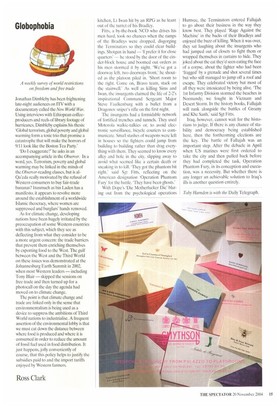Globophobia
A weekly survey of world restrictions on freedom and free trade Jonathan Dimbleby has been frightening late-night audiences on ITV with a documentary called the New World War. Using interviews with Ethiopean coffeeproducers and reels of library footage of hurricanes, Dimbleby explains his thesis: 'Global termrism, global poverty and global warming form a toxic trio that promise a catastrophe that will make the horrors of 9/11 look like the Boston Tea Party!
'Do 1 exaggerate'?' he asks in an accompanying article in the Observer. In a word, yes. Terrorism, poverty and global warming may be linked in the minds of the Observer-reading classes, but is alOa'eda really motivated by the refusal of Western consumers to buy fair-trade bananas? Inasmuch as bin Laden has a manifesto, it appears to revolve more around the establishment of a worldwide Islamic theocracy, where women are suppressed and burglars' hands removed.
As for climate change, developing nations have been hugely irritated by the preoccupation of some Western countries with this subject, which they see as deflecting from what they consider to be a more urgent concern: the trade barriers that prevent them enriching themselves by exporting food to the West. The gulf between the West and the Third World on these issues was demonstrated at the Johannesburg Earth Summit in 2002, when most Western leaders — including Tony Blair — skipped the sessions on free trade and then turned up for a photocall on the day the agenda had moved on to climate change.
The point is that climate change and trade are linked only in the sense that environmentalism is being used as a device to suppress the ambitions of Third World nations to industrialise, A frequent assertion of the environmental lobby is that we must cut down the distance between where food is produced and where it is consumed in order to reduce the amount of fossil fuel used in food distribution. It just happens, jolly conveniently of course, that this policy helps to justify the subsidies paid to and the import tariffs enjoyed by Western farmers.
Ross Clark


























































































 Previous page
Previous page